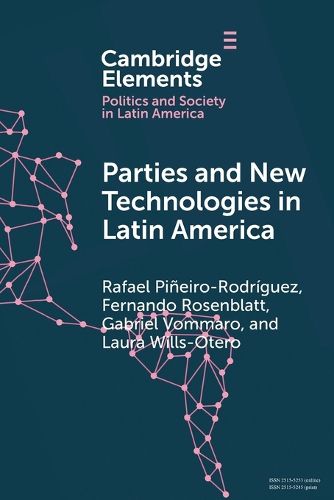Readings Newsletter
Become a Readings Member to make your shopping experience even easier.
Sign in or sign up for free!
You’re not far away from qualifying for FREE standard shipping within Australia
You’ve qualified for FREE standard shipping within Australia
The cart is loading…






This Element analyzes the incorporation of new information and communication technologies (ICTs) by different parties in Latin America to organize volunteers and mobilize supporters during elections. It assesses ICT-related changes in how parties recruit prospective candidates, collect information about citizens' preferences, and mobilize for elections and how these changes have reduced the power of the rank and file within party organizations. Party leaders have an incentive to incorporate new ICTs to increase electoral efficacy and reduce the role of rank-and-file members in performing essential party functions. However, the result of the incorporation of technology depends on leaders' capacity to control the process within the party. Based on case studies of ICT incorporation by various Latin American parties and electoral campaigns, the authors posit that the incorporation of technology will consolidate a power dynamic that predates the adoption of ICTs to fulfill organizational functions.
$9.00 standard shipping within Australia
FREE standard shipping within Australia for orders over $100.00
Express & International shipping calculated at checkout
This Element analyzes the incorporation of new information and communication technologies (ICTs) by different parties in Latin America to organize volunteers and mobilize supporters during elections. It assesses ICT-related changes in how parties recruit prospective candidates, collect information about citizens' preferences, and mobilize for elections and how these changes have reduced the power of the rank and file within party organizations. Party leaders have an incentive to incorporate new ICTs to increase electoral efficacy and reduce the role of rank-and-file members in performing essential party functions. However, the result of the incorporation of technology depends on leaders' capacity to control the process within the party. Based on case studies of ICT incorporation by various Latin American parties and electoral campaigns, the authors posit that the incorporation of technology will consolidate a power dynamic that predates the adoption of ICTs to fulfill organizational functions.